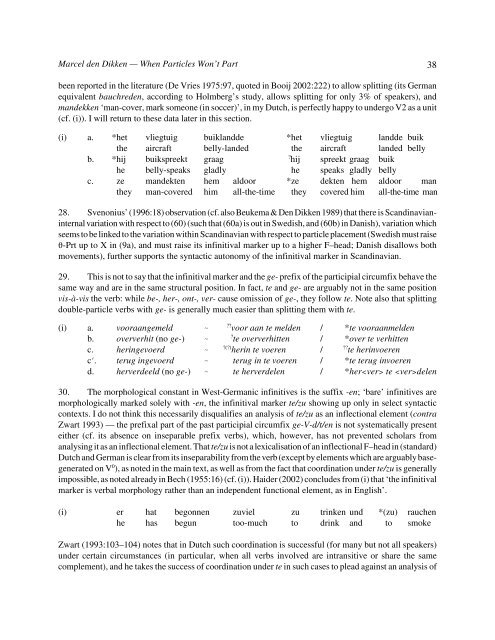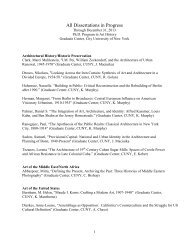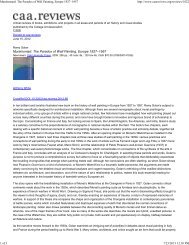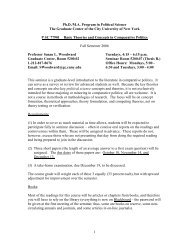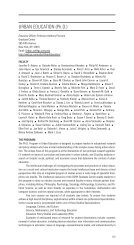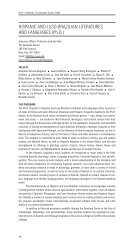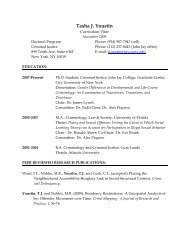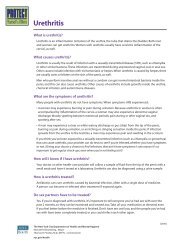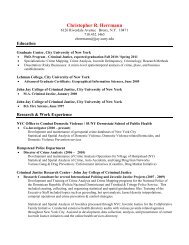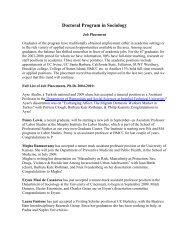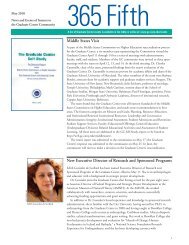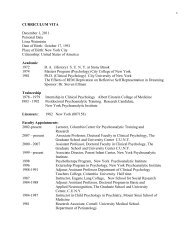When Particles Won't Part - CUNY Graduate Center
When Particles Won't Part - CUNY Graduate Center
When Particles Won't Part - CUNY Graduate Center
You also want an ePaper? Increase the reach of your titles
YUMPU automatically turns print PDFs into web optimized ePapers that Google loves.
Marcel den Dikken — <strong>When</strong> <strong><strong>Part</strong>icles</strong> Won’t <strong>Part</strong><br />
been reported in the literature (De Vries 1975:97, quoted in Booij 2002:222) to allow splitting (its German<br />
equivalent bauchreden, according to Holmberg’ s study, allows splitting for only 3% of speakers), and<br />
mandekken ‘man-cover, mark someone (in soccer)’ , in my Dutch, is perfectly happy to undergo V2 as a unit<br />
(cf. (i)). I will return to these data later in this section.<br />
(i) a. *het vliegtuig buiklandde *het vliegtuig landde buik<br />
the aircraft belly-landed the aircraft landed belly<br />
b. *hij buikspreekt graag ? hij spreekt graag buik<br />
he belly-speaks gladly he speaks gladly belly<br />
c. ze mandekten hem aldoor *ze dekten hem aldoor man<br />
they man-covered him all-the-time they covered him all-the-time man<br />
28. Svenonius’ (1996:18) observation (cf. also Beukema & Den Dikken 1989) that there is Scandinavianinternal<br />
variation with respect to (60) (such that (60a) is out in Swedish, and (60b) in Danish), variation which<br />
seems to be linked to the variation within Scandinavian with respect to particle placement (Swedish must raise<br />
2-Prt up to X in (9a), and must raise its infinitival marker up to a higher F–head; Danish disallows both<br />
movements), further supports the syntactic autonomy of the infinitival marker in Scandinavian.<br />
29. This is not to say that the infinitival marker and the ge- prefix of the participial circumfix behave the<br />
same way and are in the same structural position. In fact, te and ge- are arguably not in the same position<br />
vis-à-vis the verb: while be-, her-, ont-, ver- cause omission of ge-, they follow te. Note also that splitting<br />
double-particle verbs with ge- is generally much easier than splitting them with te.<br />
(i) a. vooraangemeld - ?? voor aan te melden / *te vooraanmelden<br />
b. oververhit (no ge-) - ? te oververhitten / *over te verhitten<br />
c. heringevoerd - ?(?) herin te voeren / ?? te herinvoeren<br />
cN. terug ingevoerd - terug in te voeren / *te terug invoeren<br />
d. herverdeeld (no ge-) - te herverdelen / *her te delen<br />
30. The morphological constant in West-Germanic infinitives is the suffix -en; ‘bare’ infinitives are<br />
morphologically marked solely with -en, the infinitival marker te/zu showing up only in select syntactic<br />
contexts. I do not think this necessarily disqualifies an analysis of te/zu as an inflectional element (contra<br />
Zwart 1993) — the prefixal part of the past participial circumfix ge-V-d/t/en is not systematically present<br />
either (cf. its absence on inseparable prefix verbs), which, however, has not prevented scholars from<br />
analysing it as an inflectional element. That te/zu is not a lexicalisation of an inflectional F–head in (standard)<br />
Dutch and German is clear from its inseparability from the verb (except by elements which are arguably basegenerated<br />
on V 0 ), as noted in the main text, as well as from the fact that coordination under te/zu is generally<br />
impossible, as noted already in Bech (1955:16) (cf. (i)). Haider (2002) concludes from (i) that ‘the infinitival<br />
marker is verbal morphology rather than an independent functional element, as in English’ .<br />
(i) er hat begonnen zuviel zu trinken und *(zu) rauchen<br />
he has begun too-much to drink and to smoke<br />
Zwart (1993:103–104) notes that in Dutch such coordination is successful (for many but not all speakers)<br />
under certain circumstances (in particular, when all verbs involved are intransitive or share the same<br />
complement), and he takes the success of coordination under te in such cases to plead against an analysis of<br />
38


